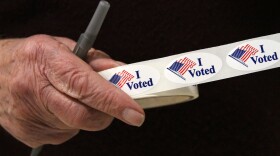Election Night in the U.S. is typically like watching a high-stakes sporting event -- two teams going head to head, and by the end of the night we know the winner. Of course, in this case, it’s the networks that call it. This year, with the enormous volume of mail-in ballots, the decision to call that winner is going to be more fraught than usual.
There’s an important distinction between the election night projection and certified results. Only a state has the ability to say who won in that state -- they’re the ones counting the ballots. What a network does is based on exit polls and initial returns from states as ballots are counted. Media outlets have seasoned journalists and analysts who assess the numbers and help networks to project a winner. The bigger the margin, the easier this is.
These numbers are by and large coming form exit polls, a written survey that voters fill out as they leave a polling place after casting their ballots. They’ve been around since the seventies as a way to allow networks insight into the election long before the polls close and ballots are counted. The modern version is a combined effort on the part of the National Election Pool (a consortium consisting of CNN, NBC, CBS and ABC) and Edison Research. These networks will share the data they collect, while Fox News has teamed up with the Associated Press and the University of Chicago to develop a different series of surveys, so they’ll be basing their election projections on a different methodology. Both methods, though, involve surveying people before the election, since so many have pivoted to mail-in absentee voting.
That pivot will likely make for a different scene on Election Night this year, with most analysts warning that we may not know for certain who the president for days, weeks or even months to come. Ballot counting varies wildly from state to state. There are regions that will have been able to do ballot process prep before Election Night. They'll be able to count mail-in ballots alongside day-of ballots. Those states that don't allow for pre-processing, though, won't be able to do a thing until the polls close. Some states have changed their election law to provide for the high volume of ballots, but Pennsylvania and Wisconsin, for example, have not. These battleground states could mean predicting a winner is not in the cards for at least a few days after Election Day.
There has already been widespread suggestion that mail-in ballots and ballots counted after electionnday are somehow invalid. In actual fact, we have never known the final tally of votes on Election Night. There have always been votes counted in the days and weeks after the election itself. The votes of our active duty military, for example, that pour in from all over the world. Depending on what state they’re voting in, their ballots may not be counted for over a week after election day. The simple difference this year is that there are far more absentee ballots than ususal.








